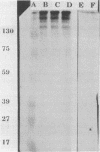Abstract
Mice infected with coxsackievirus B develop immunologically mediated inflammatory myocarditis in heart tissue that results in the development of autoantibodies with multiple idiotypes. The specificity and temporal development of autoantibodies produced during coxsackievirus B3 infection were assessed. Antiviral idiotypes and anti-idiotypic antibodies against coxsackievirus B3 idiotypes were detected and quantitated over 21- and 42-day periods, respectively. Both polyclonal and monoclonal anti-idiotypes exhibited greater but nonspecific binding to heart, liver, kidney, and spleen cells from virus-exposed animals and normal tissue. Binding of anti-idiotypes was also demonstrated to myosin and to solubilized heart-associated antigens but not to virus. Western immunoblot analysis revealed that monoclonal and polyclonal anti-idiotypes selectively bound to hypertonic, salt-extracted, solubilized proteins of myocyte extracts of virus-exposed animals.
Full text
PDF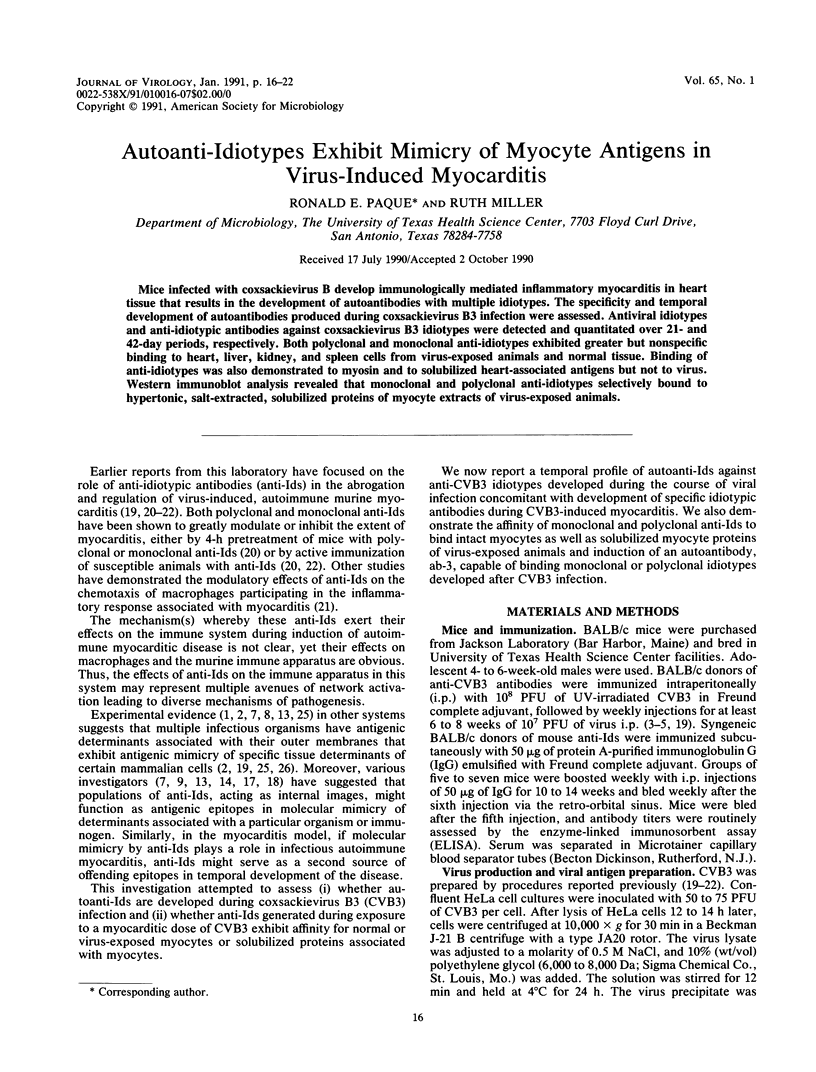
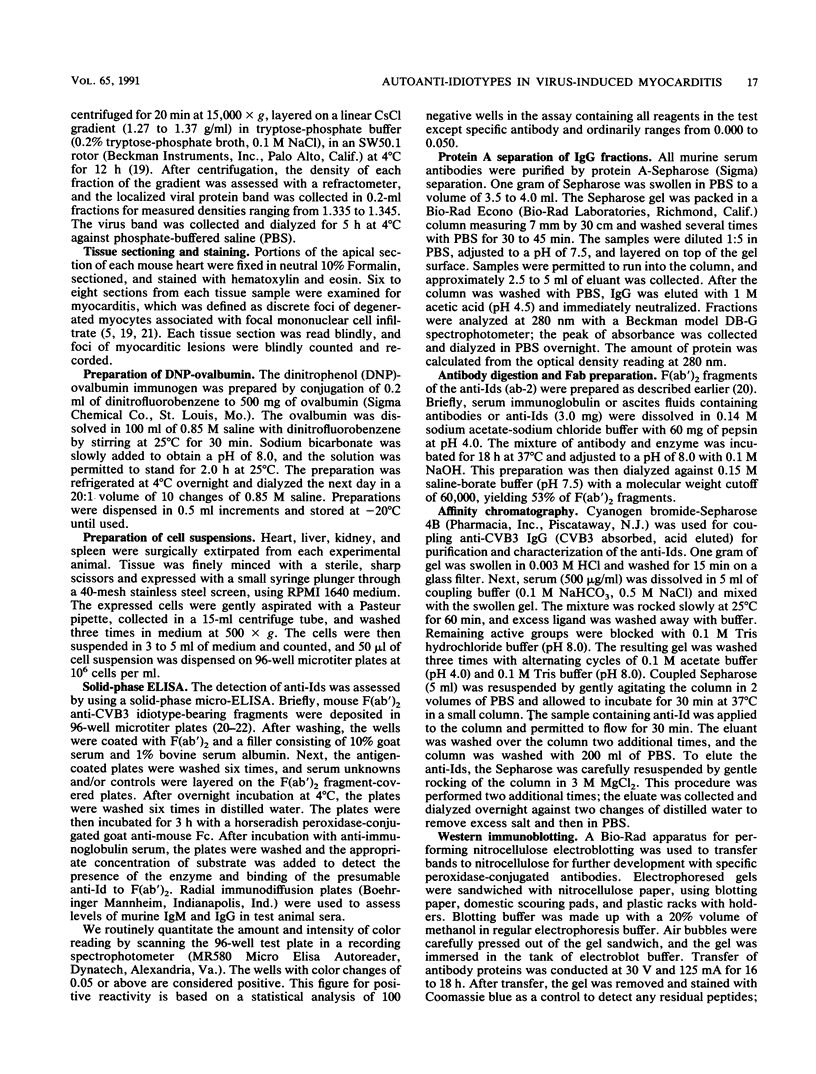
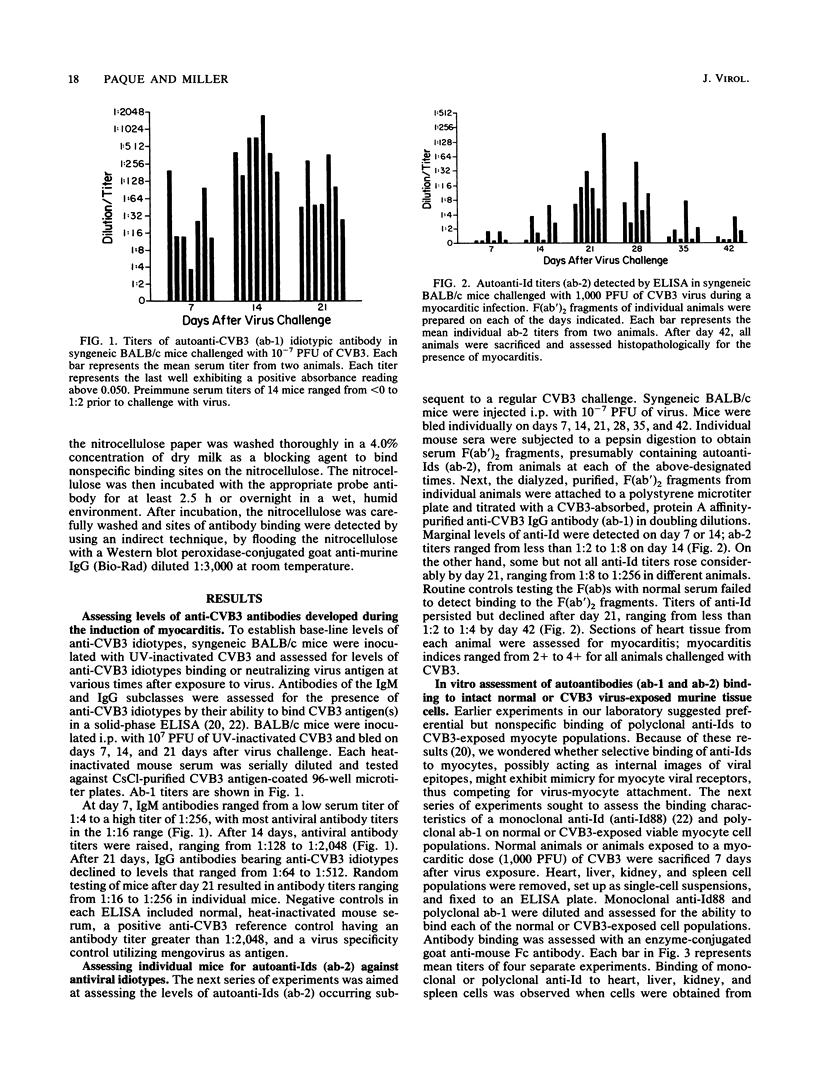
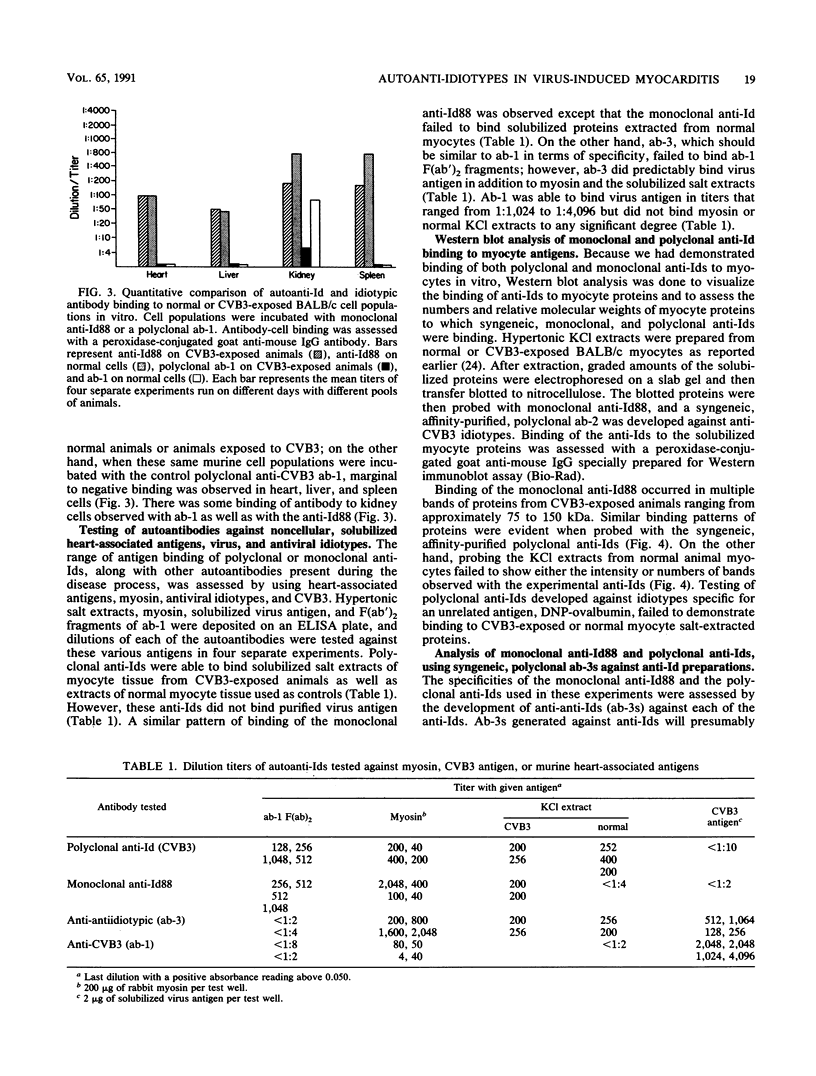
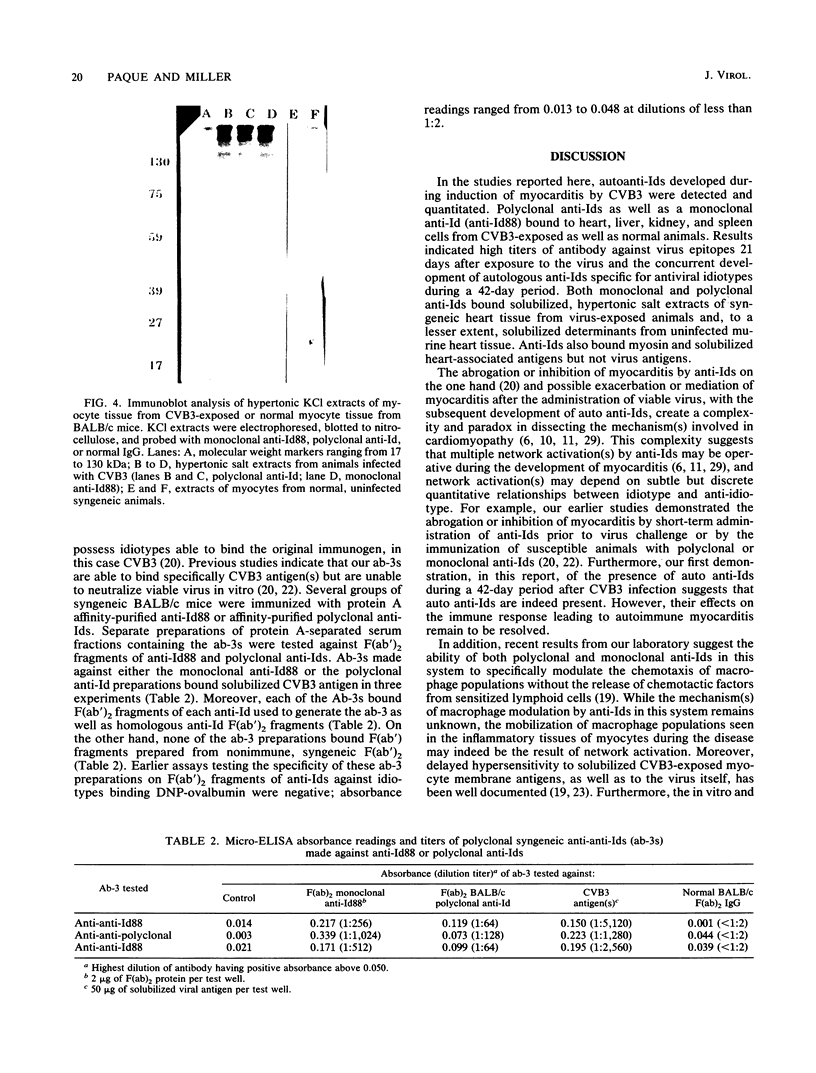
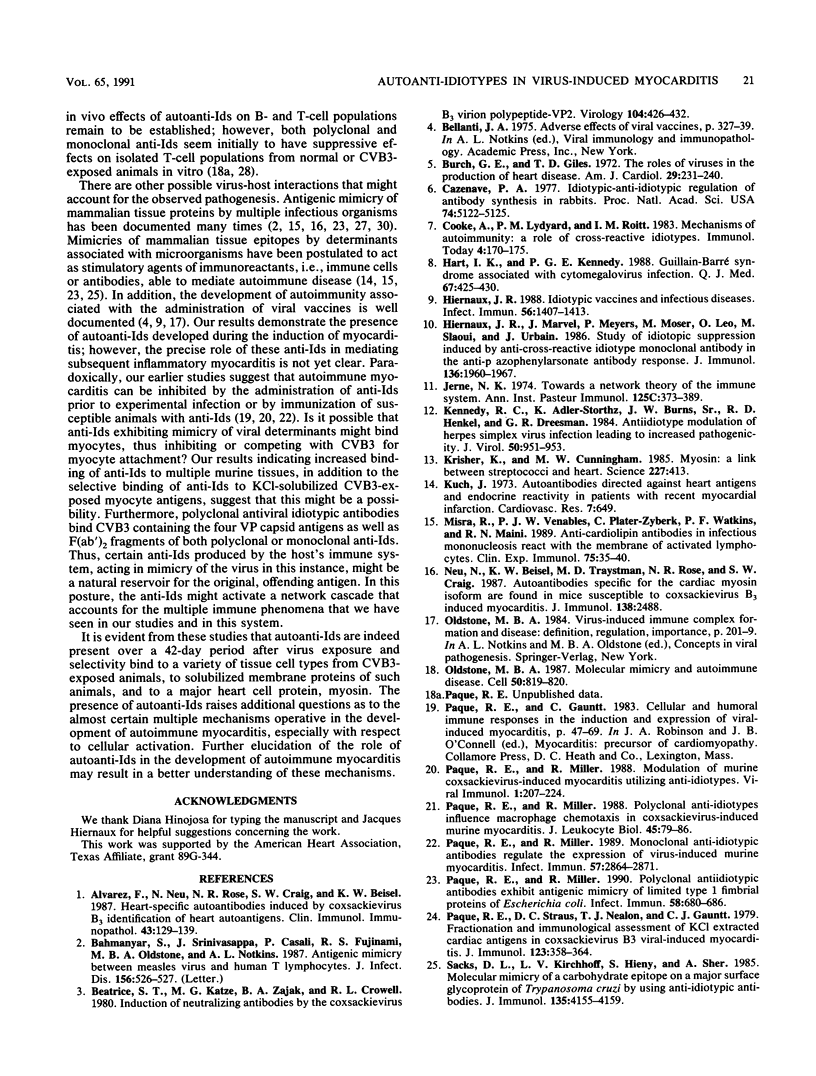
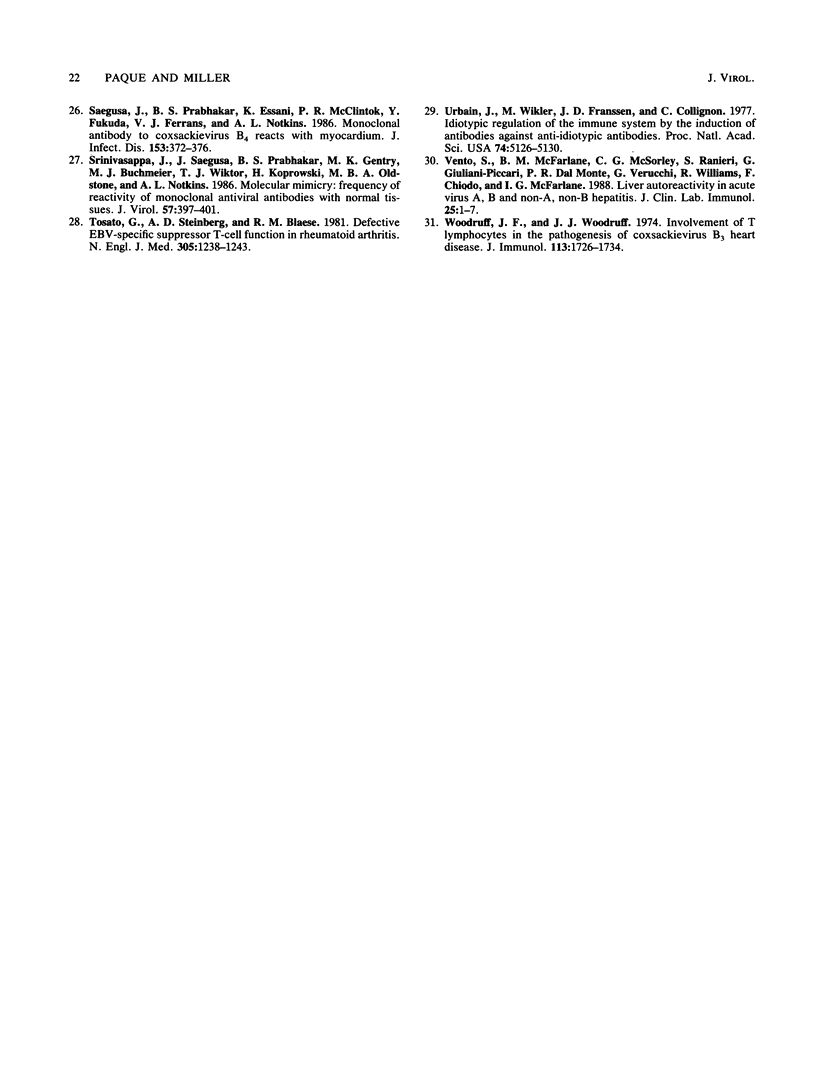
Images in this article
Selected References
These references are in PubMed. This may not be the complete list of references from this article.
- Alvarez F. L., Neu N., Rose N. R., Craig S. W., Beisel K. W. Heart-specific autoantibodies induced by Coxsackievirus B3: identification of heart autoantigens. Clin Immunol Immunopathol. 1987 Apr;43(1):129–139. doi: 10.1016/0090-1229(87)90164-4. [DOI] [PubMed] [Google Scholar]
- Bahmanyar S., Srinivasappa J., Casali P., Fujinami R. S., Oldstone M. B., Notkins A. L. Antigenic mimicry between measles virus and human T lymphocytes. J Infect Dis. 1987 Sep;156(3):526–527. doi: 10.1093/infdis/156.3.526. [DOI] [PubMed] [Google Scholar]
- Beatrice S. T., Katze M. G., Zajac B. A., Crowell R. L. Induction of neutralizing antibodies by the coxsackievirus B3 virion polypeptide, VP2. Virology. 1980 Jul 30;104(2):426–438. doi: 10.1016/0042-6822(80)90345-1. [DOI] [PubMed] [Google Scholar]
- Burch G. E., Giles T. D. The role of viruses in the production of heart disease. Am J Cardiol. 1972 Feb;29(2):231–240. doi: 10.1016/0002-9149(72)90634-0. [DOI] [PubMed] [Google Scholar]
- Cazenave P. A. Idiotypic-anti-idiotypic regulation of antibody synthesis in rabbits. Proc Natl Acad Sci U S A. 1977 Nov;74(11):5122–5125. doi: 10.1073/pnas.74.11.5122. [DOI] [PMC free article] [PubMed] [Google Scholar]
- Hart I. K., Kennedy P. G. Guillain-Barré syndrome associated with cytomegalovirus infection. Q J Med. 1988 May;67(253):425–430. [PubMed] [Google Scholar]
- Hiernaux J. R. Idiotypic vaccines and infectious diseases. Infect Immun. 1988 Jun;56(6):1407–1413. doi: 10.1128/iai.56.6.1407-1413.1988. [DOI] [PMC free article] [PubMed] [Google Scholar]
- Hiernaux J. R., Marvel J., Meyers P., Moser M., Leo O., Slaoui M., Urbain J. Study of idiotopic suppression induced by anti-cross-reactive idiotype monoclonal antibody in the anti-p-azophenylarsonate antibody response. J Immunol. 1986 Mar 15;136(6):1960–1967. [PubMed] [Google Scholar]
- Jerne N. K. Towards a network theory of the immune system. Ann Immunol (Paris) 1974 Jan;125C(1-2):373–389. [PubMed] [Google Scholar]
- Kennedy R. C., Adler-Storthz K., Burns J. W., Sr, Henkel R. D., Dreesman G. R. Antiidiotype modulation of herpes simplex virus infection leading to increased pathogenicity. J Virol. 1984 Jun;50(3):951–953. doi: 10.1128/jvi.50.3.951-953.1984. [DOI] [PMC free article] [PubMed] [Google Scholar]
- Krisher K., Cunningham M. W. Myosin: a link between streptococci and heart. Science. 1985 Jan 25;227(4685):413–415. doi: 10.1126/science.2578225. [DOI] [PubMed] [Google Scholar]
- Kuch J. Autoantibodies directed against heart antigens and endocrine reactivity in patients with recent myocardial infarction. Cardiovasc Res. 1973 Sep;7(5):649–654. doi: 10.1093/cvr/7.5.649. [DOI] [PubMed] [Google Scholar]
- Misra R., Venables P. J., Plater-Zyberk C., Watkins P. F., Maini R. N. Anti-cardiolipin antibodies in infectious mononucleosis react with the membrane of activated lymphocytes. Clin Exp Immunol. 1989 Jan;75(1):35–40. [PMC free article] [PubMed] [Google Scholar]
- Neu N., Beisel K. W., Traystman M. D., Rose N. R., Craig S. W. Autoantibodies specific for the cardiac myosin isoform are found in mice susceptible to Coxsackievirus B3-induced myocarditis. J Immunol. 1987 Apr 15;138(8):2488–2492. [PubMed] [Google Scholar]
- Oldstone M. B. Molecular mimicry and autoimmune disease. Cell. 1987 Sep 11;50(6):819–820. doi: 10.1016/0092-8674(87)90507-1. [DOI] [PubMed] [Google Scholar]
- Paque R. E., Miller R. Modulation of murine coxsackievirus-induced myocarditis utilizing anti-idiotypes. Viral Immunol. 1987;1(3):207–224. doi: 10.1089/vim.1987.1.207. [DOI] [PubMed] [Google Scholar]
- Paque R. E., Miller R. Monoclonal anti-idiotypic antibodies regulate the expression of virus-induced murine myocarditis. Infect Immun. 1989 Sep;57(9):2864–2871. doi: 10.1128/iai.57.9.2864-2871.1989. [DOI] [PMC free article] [PubMed] [Google Scholar]
- Paque R. E., Miller R. Polyclonal anti-idiotypes influence macrophage chemotaxis in coxsackievirus-induced murine myocarditis. J Leukoc Biol. 1989 Jan;45(1):79–86. doi: 10.1002/jlb.45.1.79. [DOI] [PubMed] [Google Scholar]
- Paque R. E., Miller R., Thomas V. Polyclonal anti-idiotypic antibodies exhibit antigenic mimicry of limited type 1 fimbrial proteins of Escherichia coli. Infect Immun. 1990 Mar;58(3):680–686. doi: 10.1128/iai.58.3.680-686.1990. [DOI] [PMC free article] [PubMed] [Google Scholar]
- Paque R. E., Straus D. C., Nealon T. J., Gauntt C. J. Fractionation and immunologic assessment of KCl-extracted cardiac antigens in coxsackievirus B3 virus-induced myocarditis. J Immunol. 1979 Jul;123(1):358–364. [PubMed] [Google Scholar]
- Sacks D. L., Kirchhoff L. V., Hieny S., Sher A. Molecular mimicry of a carbohydrate epitope on a major surface glycoprotein of Trypanosoma cruzi by using anti-idiotypic antibodies. J Immunol. 1985 Dec;135(6):4155–4159. [PubMed] [Google Scholar]
- Saegusa J., Prabhakar B. S., Essani K., McClintock P. R., Fukuda Y., Ferrans V. J., Notkins A. L. Monoclonal antibody to coxsackievirus B4 reacts with myocardium. J Infect Dis. 1986 Feb;153(2):372–373. doi: 10.1093/infdis/153.2.372. [DOI] [PubMed] [Google Scholar]
- Srinivasappa J., Saegusa J., Prabhakar B. S., Gentry M. K., Buchmeier M. J., Wiktor T. J., Koprowski H., Oldstone M. B., Notkins A. L. Molecular mimicry: frequency of reactivity of monoclonal antiviral antibodies with normal tissues. J Virol. 1986 Jan;57(1):397–401. doi: 10.1128/jvi.57.1.397-401.1986. [DOI] [PMC free article] [PubMed] [Google Scholar]
- Tosato G., Steinberg A. D., Blaese R. M. Defective EBV-specific suppressor T-cell function in rheumatoid arthritis. N Engl J Med. 1981 Nov 19;305(21):1238–1243. doi: 10.1056/NEJM198111193052102. [DOI] [PubMed] [Google Scholar]
- Urbain J., Wikler M., Franssen J. D., Collignon C. Idiotypic regulation of the immune system by the induction of antibodies against anti-idiotypic antibodies. Proc Natl Acad Sci U S A. 1977 Nov;74(11):5126–5130. doi: 10.1073/pnas.74.11.5126. [DOI] [PMC free article] [PubMed] [Google Scholar]
- Woodruff J. F., Woodruff J. J. Involvement of T lymphocytes in the pathogenesis of coxsackie virus B3 heart disease. J Immunol. 1974 Dec;113(6):1726–1734. [PubMed] [Google Scholar]



